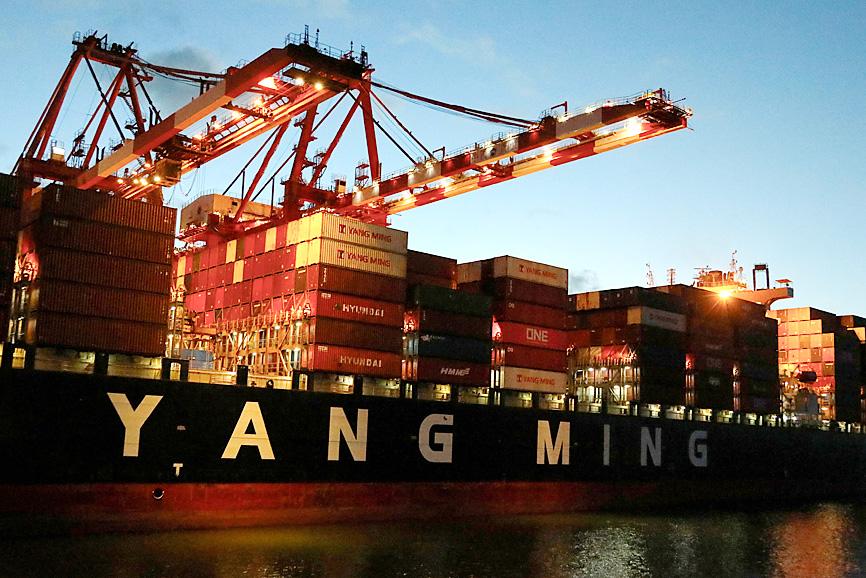Yang Ming Marine Transport Corp (陽明海運) on Thursday reported that it returned to the black last year with a profit of NT$11.98 billion (US$418.9 million), after a net loss of NT$4.3 billion in 2019, thanks to increased revenue, higher freight rates and relatively low bunker fuel prices.
Earnings per share last year reached NT$4.51, after losses per share of NT$1.66 in 2019, while revenue rose 1.4 percent to NT$151.28 billion, up from NT$149.18 billion, the company said, adding that gross margin rose to 17.24 percent, thanks to lower fuel costs.
The company’s board of directors decided not to distribute a cash dividend this year, continuing a policy began in 2011.

Photo: Ann Wang, Reuters
Yang Ming chairman Cheng Cheng-mount (鄭貞茂) has prioritized improving the company’s financial outlook, and last year’s earnings might be used to offset the firm’s accumulated losses.
Yang Ming said that the container shipping market experienced a downturn in the first half of last year due to the COVID-19 pandemic, but demand has increased since mid-August.
“The rebound was supported by a change in consumer behavior since COVID-19 lockdowns, including an accelerated adoption of e-commerce, and an increased need for hygiene products, housewares and work-from-home essentials,” Yang Ming said in a statement.
“Due to sudden inventory buildup, the surge in demand resulted in a global shortage of empty containers and capacity constraints, which led to an increase in freight rates on East-West and intra-Asia trade routes,” it said.
The upward trend continued through the end of last year, resulting in a fourth-quarter net profit of NT$10.12 billion, up from NT$1.85 billion in the previous three quarters, the company said.
The strong performance helped it eliminate the accumulated deficit by the end of last year, Yang Ming said.
To further enhance its financial outlook, the company said that it would increase capital by issuing up to 300 million new common shares and establish public underwriting through book building.
Yang Ming shares on Friday rose 1.5 percent in Taipei trading to close at NT$34.
The company’s share price has so far this year advanced 16.24 percent, compared with a 10.68 percent increase in the broader market, Taiwan Stock Exchange data showed.
Capital Investment Management Corp (群益投顧) on Friday retained a “buy” rating for the stock, saying that the company’s profit this quarter is expected to be higher than last quarter’s, as the container shipping market would benefit from higher freight rates on European and US routes.
“Major global container shippers have recently signaled that the market boom might continue through the third quarter of 2021, indicating that the shortage of containers and the port congestion have not yet been resolved in the short term,” Capital said in a note.
“It is expected that the freight rates on European routes will stop falling when the industry enters its peak season, and the freight rate on US routes will stay high due to persistent congestion at ports,” it said. “This will help support container shippers’ operating performance in the second quarter of 2021.”

MULTIFACETED: A task force has analyzed possible scenarios and created responses to assist domestic industries in dealing with US tariffs, the economics minister said The Executive Yuan is tomorrow to announce countermeasures to US President Donald Trump’s planned reciprocal tariffs, although the details of the plan would not be made public until Monday next week, Minister of Economic Affairs J.W. Kuo (郭智輝) said yesterday. The Cabinet established an economic and trade task force in November last year to deal with US trade and tariff related issues, Kuo told reporters outside the legislature in Taipei. The task force has been analyzing and evaluating all kinds of scenarios to identify suitable responses and determine how best to assist domestic industries in managing the effects of Trump’s tariffs, he

TIGHT-LIPPED: UMC said it had no merger plans at the moment, after Nikkei Asia reported that the firm and GlobalFoundries were considering restarting merger talks United Microelectronics Corp (UMC, 聯電), the world’s No. 4 contract chipmaker, yesterday launched a new US$5 billion 12-inch chip factory in Singapore as part of its latest effort to diversify its manufacturing footprint amid growing geopolitical risks. The new factory, adjacent to UMC’s existing Singapore fab in the Pasir Res Wafer Fab Park, is scheduled to enter volume production next year, utilizing mature 22-nanometer and 28-nanometer process technologies, UMC said in a statement. The company plans to invest US$5 billion during the first phase of the new fab, which would have an installed capacity of 30,000 12-inch wafers per month, it said. The

Taiwan’s official purchasing managers’ index (PMI) last month rose 0.2 percentage points to 54.2, in a second consecutive month of expansion, thanks to front-loading demand intended to avoid potential US tariff hikes, the Chung-Hua Institution for Economic Research (CIER, 中華經濟研究院) said yesterday. While short-term demand appeared robust, uncertainties rose due to US President Donald Trump’s unpredictable trade policy, CIER president Lien Hsien-ming (連賢明) told a news conference in Taipei. Taiwan’s economy this year would be characterized by high-level fluctuations and the volatility would be wilder than most expect, Lien said Demand for electronics, particularly semiconductors, continues to benefit from US technology giants’ effort

‘SWASTICAR’: Tesla CEO Elon Musk’s close association with Donald Trump has prompted opponents to brand him a ‘Nazi’ and resulted in a dramatic drop in sales Demonstrators descended on Tesla Inc dealerships across the US, and in Europe and Canada on Saturday to protest company chief Elon Musk, who has amassed extraordinary power as a top adviser to US President Donald Trump. Waving signs with messages such as “Musk is stealing our money” and “Reclaim our country,” the protests largely took place peacefully following fiery episodes of vandalism on Tesla vehicles, dealerships and other facilities in recent weeks that US officials have denounced as terrorism. Hundreds rallied on Saturday outside the Tesla dealership in Manhattan. Some blasted Musk, the world’s richest man, while others demanded the shuttering of his